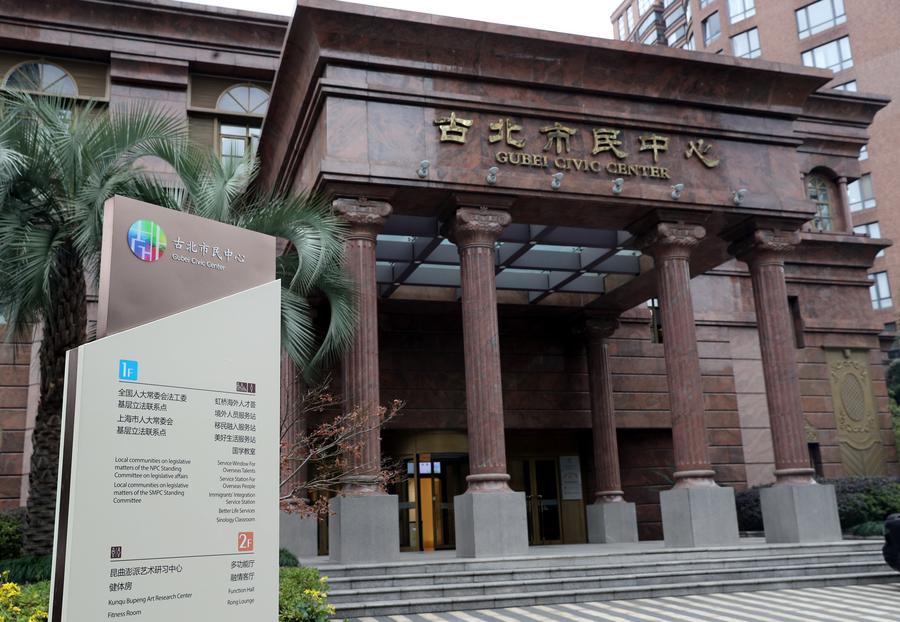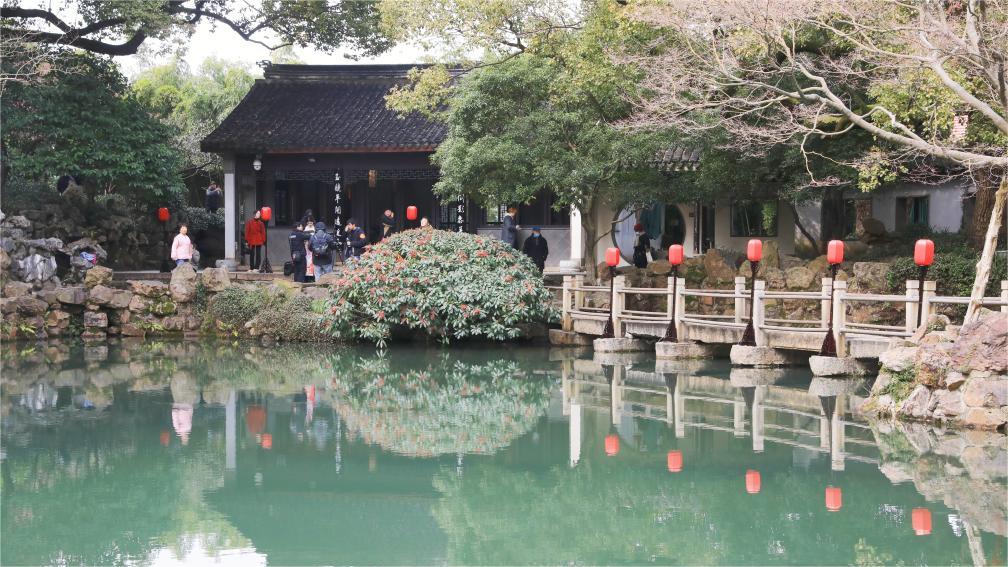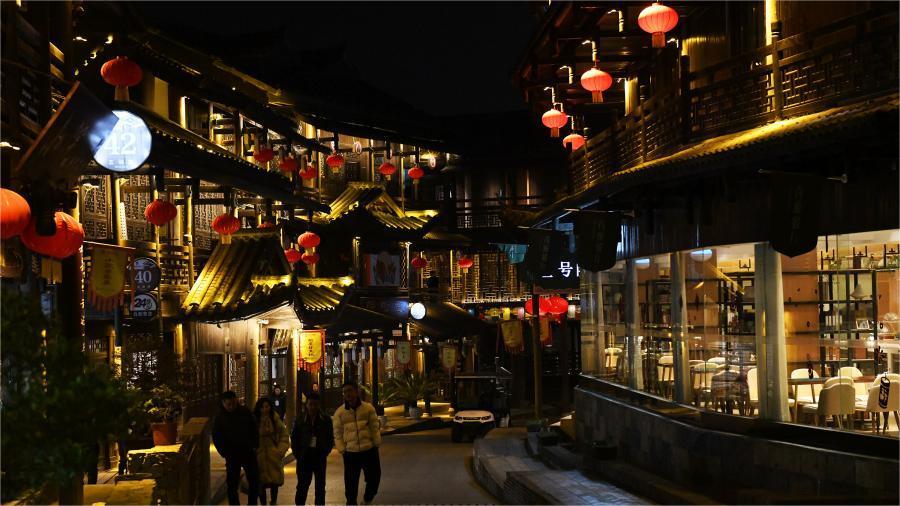A deep dive into Xi Jinping's stewardship of whole-process people's democracy

Chinese President Xi Jinping, also general secretary of the Communist Party of China (CPC) Central Committee and chairman of the Central Military Commission, joins deliberation with deputies from central China's Henan Province at the second session of the 13th National People's Congress in Beijing, capital of China, March 8, 2019. (Xinhua/Xie Huanchi)
BEIJING, March 3 (Xinhua) -- The upcoming annual sessions of China's national legislature and political advisory body provide a prime opportunity for observers to gain a unique vantage point to witness the country's democracy in action.
From group deliberations to discussions with lawmakers and political advisors, President Xi Jinping will be active in China's democratic policy formulation and decision-making.
Xi, acting in his capacity as one of the nearly 3,000 deputies elected to the National People's Congress (NPC), will join his fellow deputies to review and vote on the performance of the central government, the national legislature, the top court and the top procuratorate over the past year. He will also cast his vote on any new law and major revision submitted to the session for deliberation.
Throughout his career, the Chinese leader has championed people's democracy.
"Democracy is a value shared by all humanity and an ideal that the Communist Party of China (CPC) and the Chinese people have always upheld," said Xi, also general secretary of the CPC Central Committee.
As the top leader of both the Party and the state, he has spearheaded efforts to pursue whole-process people's democracy, a key concept put forward by Xi himself to advance China's political landscape after seeing the shortfalls of Western democracy.
Under his guidance, China has made all-around progress in improving the institutions, standards, and procedures of socialist democracy, and advanced socialist consultative democracy by way of extensive participation.
He has strongly advocated for unity between leadership by the Party, the running of the country by the people, and law-based governance to ensure that state governance escapes the historical cycle of rise and fall.
Zhang Weiwei, director of the China Institute of Fudan University, highlighted that Chinese democracy diverges from the Western model that is centered around multi-party rotation and universal suffrage for leaders.
Chinese democracy, Zhang said, emphasizes extensive public participation, policy consultations, and the pursuit of good governance.
PEOPLE AS MASTERS
Half a month before this year's "two sessions," the Party's flagship magazine Qiu Shi published an article by Xi on democracy, expounding on the people's congress system.
"The system is an important institutional vehicle for realizing whole-process people's democracy," Xi wrote, drawing attention to its essence -- that all power of the state belongs to the people and the people's position as masters of the country should be protected to the greatest extent.
After re-elected Chinese president and chairman of the country's Central Military Commission at the annual session of the national legislature in March 2023, Xi emphasized the imperative of adopting a people-centered development philosophy.
He underscored the need for ensuring equitable distribution of the gains of modernization and pledged to drive notable and substantive advancements in fostering prosperity for all.
Observers say a key feature of China's whole-process people's democracy is to ensure it works for the vast majority of the people instead of serving the interests of capital or the elite class.
This can be seen through Xi's active interactions with grassroots people during the annual "two sessions" in forming policies. Over the past 11 years, he has participated in 56 deliberations and discussion sessions during the annual sessions, directly interacting with over 400 lawmakers and political advisors.
At one event in 2019, national lawmaker Li Liancheng, who was a village Party chief, articulated the "eight dreams" of Chinese farmers to Xi, emphasizing priorities such as local education for children, healthcare access, and local employment opportunities.
Xi, intimately familiar with rural affairs from his time in the countryside as an "educated youth" half a century ago, acknowledged the significance of Li's message, saying it resonated with the aspirations of rural residents nationwide.
He reaffirmed the government's commitment to serving the people and pledged to advance step by step toward realizing the dreams of a better life for all.
Li advocated for a more targeted approach to technological assistance, emphasizing the importance of aligning it with the real needs of villagers.
Following the meeting, government ministries conducted field research and took tailored measures in Xixinzhuang Village, Li's hometown, to enhance agricultural technology extension services.
During his participation in discussions with political advisors in 2022, Xi listened keenly as scientist Wang Jing proposed what she called green "radar" in farm fields to detect agricultural product quality and safety issues in real time.
Within a year, her proposal was put into practice nationwide, and related regulations were introduced. The technology was included as a new clause in the revised Agricultural Products Quality and Safety Law.
Xi's dedication to empowering the public and prioritizing the people's needs traces back to the early days of his political career.
In October 1984, as Party chief of Zhengding County in north China's Hebei Province, he initiated a questionnaire survey.
He stood on the streets, distributing questionnaires to residents and inviting them to sit down and have a chat.
This practice became routine and over time, evolved into the online solicitation of opinions.
Nearly four decades later, as the Party's top leader, Xi elevated this democratic practice to a whole new level. Before the Party convened its 20th National Congress, Xi ordered a massive online public opinion solicitation to listen to the people's views for drafting a keynote report he would deliver at the Party congress.
In a month, about 8.54 million public suggestions were collected to shape policies, spanning topics like carbon neutrality and education quality. These contributions were refined into 1,675 items and shared with the drafting group for the report.
As Xi has stated: Whether a country is democratic or not depends on whether its people are truly the masters of the country.

Xi Jinping, then secretary of the Zhengding County Committee of the Communist Party of China (CPC), listens to opinions of villagers in Zhengding County, north China's Hebei Province, in 1983. (Xinhua)
THE WHOLE PROCESS
In 2021, Xi convened the Party's first-ever Central People's Congress Work Conference. At the high-profile meeting, he expounded on the whole-process people's democracy and made a thinly veiled criticism of the bogus democracy practiced in certain countries.
"If the people are only engaged with to solicit votes and then are left in the dark, if they must listen to grandiose election slogans but have no voice when the elections are over, or if they are only treated well by candidates during elections and are ignored after, this is not true democracy," Xi said.
In 2019, when he first put forward "whole-process democracy," Xi said people's democracy is a type of whole-process democracy.
Observers say whole-process democracy involves more than just a matter of voting, rather, it is forged into every single link in the running of state power. This breaks from a solitary focus on voting and ensures the people's rights to democratic elections, consultations, decision-making, management, and oversight.
Xi pays close attention to each of the above-mentioned democratic processes and has no time for practices that hamper democracy.
In 2014, he discussed at length a vote-buying case in the election of local lawmakers in Hunan Province. Visibly angered, Xi fired a barrage of questions: Where did the Party members go? Where did their sense of Party discipline and law go? Where did their conscience go?
Afterward, Xi referred to this case on at least two other occasions. Eventually, 467 people were held accountable.
"In this socialist country led by the CPC, all power of the state belongs to the people," Xi told investigators of China's top graft-buster. "Political power should never be distributed according to one's social status, wealth, or personal relationships."
Xi's push for consultative democracy, which involves political consultation between the governing CPC and other political parties, dates back to his tenure as a local Party cadre.
In 1988, as Party chief of Fujian's Ningde prefecture, Xi facilitated the establishment of the first prefectural committee of the China Democratic League, a non-CPC political party. Xi initiated regular visits by CPC leaders to members of other political parties and intellectuals, emphasizing the importance of the united front.
As a top leader, Xi still allocates time to democratic decision-making and management at the grassroots.
In February 2019, he paid a visit to an inconspicuous courtyard in a central Beijing hutong that neighbors call a "courtyard meeting hall" when residents were discussing renovating their homes.
On the whiteboard were listed suggestions raised by residents: cleaning up clutter in the courtyard; ensuring fully functional kitchens, storage, and bathrooms; and bringing in professional design teams.
"When will the renovation start?" "Are there many houses with historical and cultural value?" ... Xi joined the discussion.
Hailing the courtyard meetings as a mechanism that empowered community members to discuss and decide their own affairs, Xi said, it was conducive to improving precision in community governance and services.
Xi's pursuit of an effective oversight mechanism found its embodiment in the development of China's first village affairs supervision committee in Houchen Village, Zhejiang Province.
The supervision committee was set up in 2004 amid escalating tensions between villagers and village officials regarding the management of a substantial land acquisition compensation totaling about 20 million yuan.
The committee captured the attention of Xi, who was then Zhejiang's Party chief. He visited Houchen on the committee's first anniversary, and emphasized the inevitability of its creation in a community grappling with numerous challenges.
He hailed it as the "Houchen model," lauding its role in pioneering grassroots democratic supervision in rural areas.
Over two decades, this initiative has evolved from a localized measure to a nationally recognized policy and has taken root in over 690,000 administrative villages nationwide.
Xi said that to measure whether a country is democratic, a key element is to see whether the rules and procedures for the exercise of power are democratic, and more importantly, whether the exercise of power is genuinely subject to public oversight and checks.
DEMOCRACY IS NOT COCA-COLA
In Xi's view, there is no uniform or single model of democracy; it comes in many forms.
The whole-process people's democracy practiced in China is based on the country's reality, history, and culture, and it reflects the people's will, he said, while repeatedly stressing the effectiveness of this democracy.
Officials and scholars have gone further to explain that democracy is not Coca-Cola, tasting the same across the world as the syrup is produced in one single country.
China experts view whole-process people's democracy as pivotal to the country's remarkable achievements of rapid economic growth and sustained social stability.
This role is evident in the country's formulation of effective laws to enhance governance.
In 2019, during a visit to a legislative outreach office in Shanghai, Xi talked with both Chinese and foreign residents participating in a consultation on a draft law.
Draft laws are disseminated to local legislative outreach offices to facilitate discussions among ordinary citizens, enabling their voices to be heard by the national legislature.
Xi inquired about the process of soliciting opinions on the draft law, and attentively reviewed the materials containing suggestions.
Acknowledging the office's beneficial explorations, he encouraged the maintenance of open channels for public opinion and the enrichment of democratic mechanisms.
The preparation and implementation of five-year plans for national economic and social development are an important means by which the Party governs China.
To incorporate people's wisdom into the blueprint, democracy was in full swing.
In 2020, during an inspection in Hunan Province before the formulation of the country's 14th five-year plan, Xi sat down with 30 grassroots representatives at a meeting in the provincial capital to hear their views and suggestions.
During the two-hour discussion, Pan Jiuren, a rural teacher of the Yao ethnic group, candidly addressed the deficiencies in basic education in remote regions, highlighting issues such as teacher shortages and challenging working conditions.
In response, Xi acknowledged China's progress in universalizing compulsory education since the reform and opening up. However, he underscored the escalating issue of uneven distribution of educational resources and the imperative to address this problem.
Before the five-year plan was ready for discussion at a key plenary meeting of the Party's Central Committee, Xi hosted seven such symposiums, meeting citizens from diverse backgrounds, including migrant workers, farmers, truck drivers, legal professionals, and restaurant owners.

This photo taken on Nov. 27, 2019 shows the Gubei Civic Center in Changning District of Shanghai, east China. (Xinhua/Liu Ying)
"China's democracy is no verbal mirage," said Robert Lawrence Kuhn, an American scholar and chairman of the Kuhn Foundation.
Democracy in the Party-led system involves various feedback and interactive mechanisms, especially people's congresses at various levels, and it also entails ensuring adequate standards of living for all Chinese citizens, he said.
During the 2019 "two sessions," a lawmaker from Gansu Province voiced local residents' desire for an expressway to accelerate local prosperity. Turning to an official seated beside him, Xi inquired about the number of counties in the province lacking expressways.
The interactions expedited the construction of transportation infrastructure for those in need.
In November 2023, the long-awaited expressway was put into operation. One month later, after a 6.2-magnitude earthquake struck the province, the expressway became a vital lifeline for delivering aid and transporting the injured to hospitals.
This is an example of how Xi's discussions with national legislators and political advisors during the "two sessions" concentrate on addressing challenges and proposing new methods for economic and social development.
Through these interactions, innovative governance strategies have been considered, suggested, refined, and matured.
Observant of Xi's post-deliberation actions, keen observers note his consistent selection of provincial areas for focused on-site research, addressing specific issues raised during deliberation sessions.
In 2014, he explored the Shanghai free trade zone; in 2018, he traveled to the remote Daliang Mountain in Sichuan to inspect poverty alleviation efforts; in 2021, he examined ecological protection measures on the Qinghai-Xizang Plateau in Qinghai. Many of his research priorities align with concerns voiced by national legislators and political advisors.
In navigating the complexities of governing a vast nation like China, Xi often invokes a quote from a Chinese political commentator dating back two millennia: "A bird cannot soar into the sky using only one feather, and a horse cannot gallop using only one hoof."
This ancient wisdom underscores Xi's belief that the collective strength of China's over 1.4 billion citizens must be harnessed to build a strong nation and advance national rejuvenation.
The reason why China has been so successful has been its ability to enthuse, involve and mobilize the people in the political process and thereby contribute to the country's future, said British scholar Martin Jacques.
"Too many Western politicians seem to think the point of democracy is democracy. It is not," he said. "Ultimately, democracy is about representing the people, involving the people, and creating the best form of governance, the most acceptable and the most successful form of governance."
Photos
Related Stories
- Xi's key remarks on whole-process people's democracy
- The Best Entrepreneur
- Xi stresses high-quality development of new energy, greater contributions to building clean, beautiful world
- Xi congratulates Tamas Sulyok on election as Hungarian president
- Xi urges young officials to take on historical task on new journey
- Xi stresses high-quality development of new energy in China
Copyright © 2024 People's Daily Online. All Rights Reserved.









